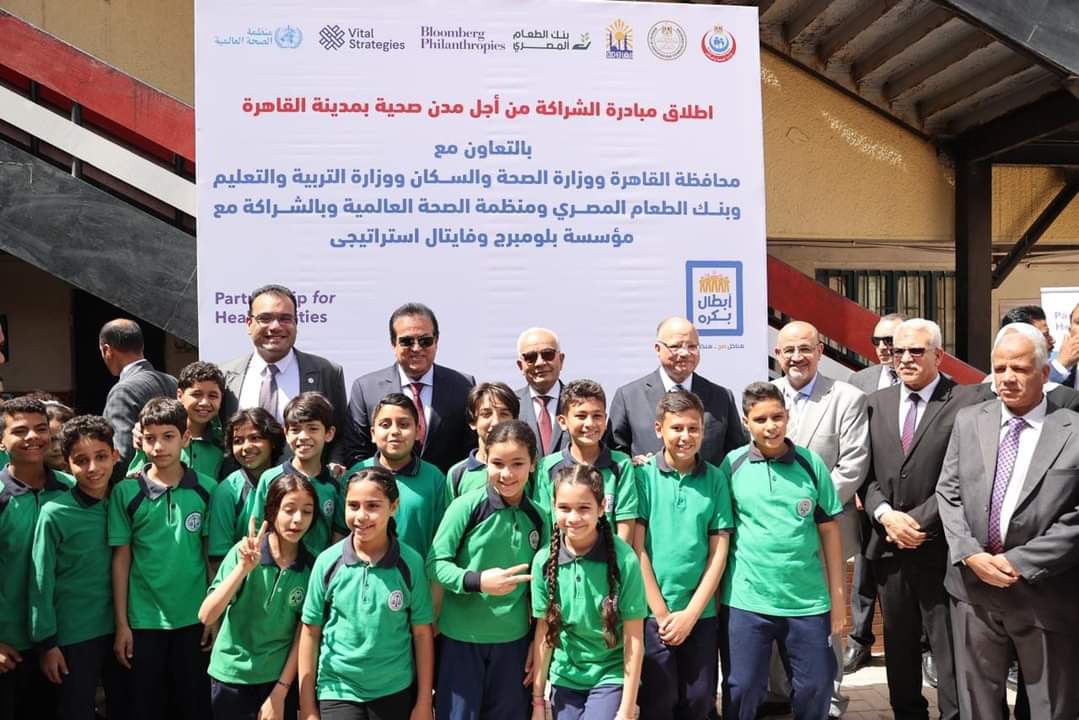 Ministers and partners are pictured at the launch event. Photo credit: Egyptian Food Bank
Ministers and partners are pictured at the launch event. Photo credit: Egyptian Food Bank
1 May 2024, Cairo, Egypt – The Partnership for Healthy Cities initiative has been formally launched in 15 public primary schools in Cairo by WHO, the Ministry of Health and Population, the Ministry of Education and Technical Education, Cairo Governorate and the Egyptian Food Bank.
The launch event on 22 April 2024 was attended by Minister of Health and Population His Excellency Dr Khaled Abdel Ghaffar; Minister of Education and Technical Education His Excellency Dr Reda Hegazy; Governor of Cairo Major General Khaled Abdel Aal; WHO Representative to Egypt Dr Nima Abid; and Chief Executive Officer of the Egyptian Food Bank Mr Mohsen Sarhan.
The Partnership for Healthy Cities, supported by Bloomberg Philanthropies in partnership with WHO and Vital Strategies, is a global network of 74 cities that work together to prevent noncommunicable diseases (NCDs) and injuries. Local leaders in partner cities are committed to choosing one of 14 programmes to reduce exposure to risk factors for NCDs, such as diabetes, heart disease and cancer, and for injuries.
Cairo Governorate joined the initiative in 2021, and the Governor chose a programme that aims to apply international nutrition standards for foods served and sold in public schools in Cairo. Work has been ongoing since then, ahead of the official launch this April.
As part of the initiative, WHO assessed the knowledge, attitudes and practices of school communities around healthy diet. Based on the results, WHO designed educational materials and a wide range of interactive educational games for children to raise awareness about nutrition among school communities.
WHO also evaluated the quality of foods sold in school canteens, and provided equipment and supplies that will enable canteens to sell healthy alternatives such as fruits and vegetables. Health educators and school canteen personnel were also trained to provide scientific information on these healthy alternatives and to motivate students to adopt a healthy diet.
In the academic year 2021/2022, a presidential initiative was conducted to detect malnutrition among primary school students. Among children aged 6–12 years, the prevalence of anaemia was estimated at about 17%. The results also show that about 4.5% of this age group suffer from stunting, while 12% of this cohort suffer from overweight or obesity.
WHO Representative to Egypt Dr Abid said: “The health of individuals not only depends on a set of interrelated biological factors that include physical, mental and psychological dimensions, but also extends beyond this as it is strongly influenced by environmental, behavioural, social and economic determinants.
“WHO is committed to supporting governments to create a healthy environment and reduce vulnerability to risk factors for NCDs and injuries. Since 84% of deaths in Egypt are attributable to NCDs, it was important to work on the most prevalent risk factors, the most important of which is unhealthy diet.”


